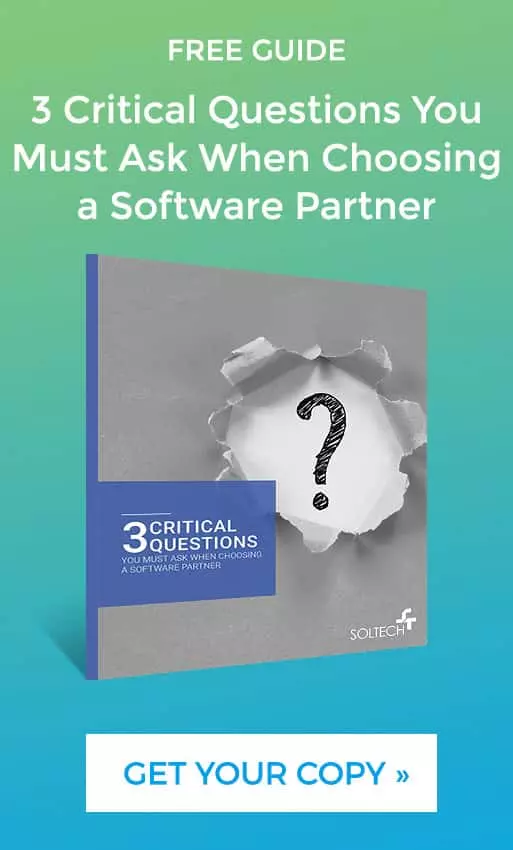
What Questions Should I Ask Before Hiring a Software Vendor?
By Tim Smith
Finding the right software vendor can be a bit daunting, particularly if the project is complex and requires a variety of technical professionals. Even simpler projects often require the skillset of more than one software developer. Many of those who are doing the hiring are put in the position of discerning one vendor over another without having the technical background or experience to know exactly what questions to ask.
Most software vendors will be happy to listen to the project requirements, provide an estimate, and a basic timeline. However, there is so much more information that should be discovered upfront before signing any contracts or trusting the project to the vendor that may sound the best from a cursory perspective.
This checklist of questions will help weed out the less desirable vendors and steer you toward the best-suited vendor that can accomplish the project successfully. You may find some of the questions to be very simple, yet it has been our experience that many clients make assumptions and decisions based on the vendor’s personality or razzle dazzle presentation rather than ask these straightforward questions.

At SOLTECH, we feel it is in the best interest of both parties to go through the due diligence process before entering into a business relationship. The following 11 questions will give you a more thorough picture and lead you toward the best choice.
Questions To Ask Before Hiring a Software Vendor
1. How long have they been in business?
This is one of those questions that may seem unnecessary, but in reality, it is advisable to work with a vendor that has been in business for more than five years. In fact, more years of experience will be to your advantage, as the industry is constantly changing. Working with a vendor that has increased their knowledge base and skillset over a longer period of time means they have a wide variety of experiences that can help circumvent common issues and problems.
Vendors that have been in business for less than five years may promote having the latest technical knowledge, but remember building software is not the same as developing a simple website. The more experienced the vendor, the better the outcome assuming all of the other questions are answered appropriately.
2. How many full-time vs part-time employees do they have?
Do they have permanent staff, or do they hire contractors for each project? This is an important question, since contract employees may leave after a project, taking all the knowledge with them. Support will be more challenging if they do not have a good knowledge transfer process.

Are there sub-contractors involved? If one or more techs are part-time and are working on your project then the focus and follow-through are compromised. Part-time employees often come and go which means that new people would be involved that have not been working on the project since its inception thus having to deal with a learning curve.
Where are their resources located? Are they on-shore or off-shore? Are they predominantly a remote company, or do they have a central hub?
The bottom line is that you want to find stability, cohesiveness, and continuity with your software vendor or unnecessary and unsettling issues may arise during the process.
3. Is the vendor familiar with your tech stack?
The software set that you are currently using provides the infrastructure for the system so it is paramount to make certain that the vendor understands your specific tech stack. For example, you may be using “legacy technology” that will be sunsetted at some point, but you’ll still need to use it in the future. Can the vendor work with your tech stack or are they recommending the latest flavor of the month technology? A highly qualified vendor will be able to ensure that the developed software can work within the tech stack and provide a seamless result.
4. Will they sign a Non-Disclosure Agreement prior to learning the details of the project?
Great software ideas are sometimes shared when an NDA has not been signed, particularly if the vendor was not hired for the project. Once made available to others outside of your company, the ideas can then be stolen and developed into a parity product. The proprietary and original idea you thought you had is no longer protected. Steer aware from vendors who don’t have and/or don’t want to sign an NDA.

If the vendor has an NDA, then ask to see a copy. Be a bit wary of vendors that don’t already have a prepared NDA. Having confidence and trust in your vendor is important; building software is not an inexpensive project.
5. Are there references that can be contacted?
Case studies can be helpful, especially when they are similar to your company’s industry, size, customer base, and geography. They will allow you to focus on examples and facts rather than opinions or hype. Also ask to review completed projects that are similar in nature and scope; it will provide assurance that the vendor has the skillset to complete the project’s requirements.
We recommend speaking with a few of their references and asking questions regarding the vendor and the finished software, such as:
- How many other vendors did you speak with before hiring Vendor X?
- Do you receive anything in exchange for being a reference?
- Why did you choose Vendor X?
- Did you have to customize or retrofit the software once it was finished?
- How responsive was the vendor when issues arise?
- Does the system perform as requested?
- Are there any pitfalls you would like to share?
- How would you rate the vendor’s support during and after the process?
6. What is their quality assurance process?
Quality assurance teams develop the rules and standards against which quality control testing will be measured in an effort for the software to achieve and maintain its quality. It is considered one of the most important processes during software creation as it ensures that it meets the specific requirements.
A well-developed quality assurance system is not the same as software testing. While the testing process can uncover glitches and bugs not found in the earlier development stages, quality assurance testing ensures the software meets the client’s requirements.
What guarantee or insurance is available if the finished software is not as anticipated or requested? You are paying for quality talent, so what are the assurances? Does the company offer insurance for large projects with risk – one that includes coverage for errors in mission, security breaches, ransomware attacks, and more?
7. Who owns the code?
Source code is highly regarded by software developers and digital agencies, which begs the question about “who owns the code”? Software vendors have their own policies and although in most instances the contracting company will own the code, it is important to find out before entering into an agreement.
Without knowing in advance, you may find out that the vendor or its contractor may hold the copyright as its first owner. However, most software developers understand that the contracting party will own the copyright yet unless it is stated in writing, the default ownership will be legally given to its first owner.
There are also instances where portions of the code may be used by the vendor to build other applications. This too must be stated in writing so make sure you understand all of the legalities involved.
8. What is the rate structure and timeline?
Software estimates and deadlines are tricky for several reasons, such as any additional features that are added during the build or information that was not provided in the beginning of the process. Therefore missed deadlines and cost overruns are somewhat common during software development. But in situations where there are no apparent or solid reasons for increased costs or delays, how will the vendor justify or rectify the situation?
Getting an agreed-upon rate structure and timeline as well as building in a bit of wiggle room will reduce or eliminate these types of issues. If estimations are continually assessed then there will be no surprises during the process. Your account manager should be providing weekly or bi-monthly progress reports that will let you know what to expect at each stage.
9. What is the invoicing process?
Whether you work with a software development agency or freelance programmer, you will want to find out exactly how the invoicing process operates. Will the line items match the original estimate? Will time tracking be provided? Are all software development skills billed out at the same rate? If not, what are the differences? How often will you receive invoices?
Increasing productivity and keeping projects in budget does require a significant amount of tracking. Knowing how each developer is spending time on projects and tasks will allow you to discuss and possibly minimize what might seem to be time-wasting activities.
Find out how each vendor handles the invoice process and if there is any flexibility should you require or prefer a different method.
10. Is there continued support after the project is complete?
Since the software development process can take up to one year, it is important to note how customer support is handled all along the way. Are there support options, such as frequent digital reports or live weekly calls? Or are you contacted only during significant milestones? Who handles support requests? What is the turnaround time in which you can expect answers? How will you confirm that the project is moving forward?
Make sure to work with a vendor that makes project management a priority. Being left in the dark or having to ask repeatedly for updates is not acceptable.
11. What is their experience in UX?
Solving usability issues is critical to making sure the software is a viable solution. It is about developing a pleasant online experience that includes a logical user flow coupled with easy accessibility. Is the vendor experienced with UX and how is it handled? What happens if bugs are discovered post-launch? Is there a warranty? What are the support terms?
When the software has been completed to your satisfaction, all eyes turn to the customer experience to make sure the software is fulfilling the users’ needs. At this point, UX winds up being the most important aspect because if the users aren’t using it, the entire project will have to be revised (incurring more costs) or scrapped altogether. Many vendors have a UX Developer who will get involved at the beginning of the project to make sure the overall technical aspects take user experience into consideration.
We have developed a guide that will help direct you through the initial process by asking the three most critical questions at the onset. Once you have narrowed down your vendor selection, query them with the checklist above.






